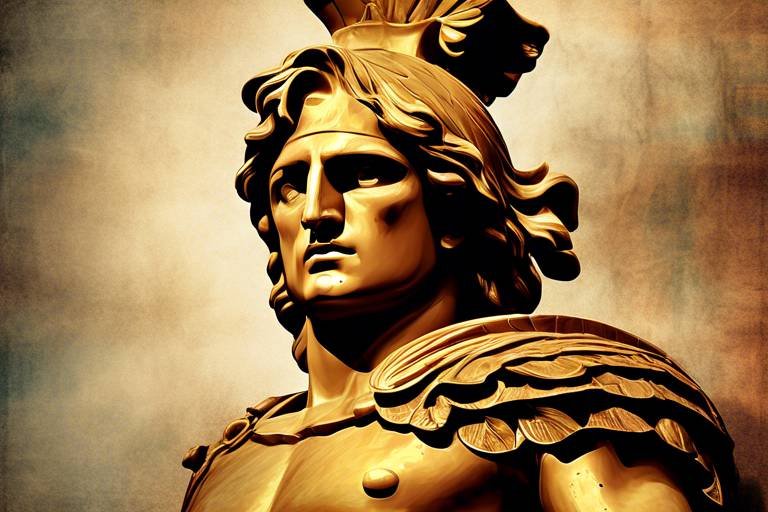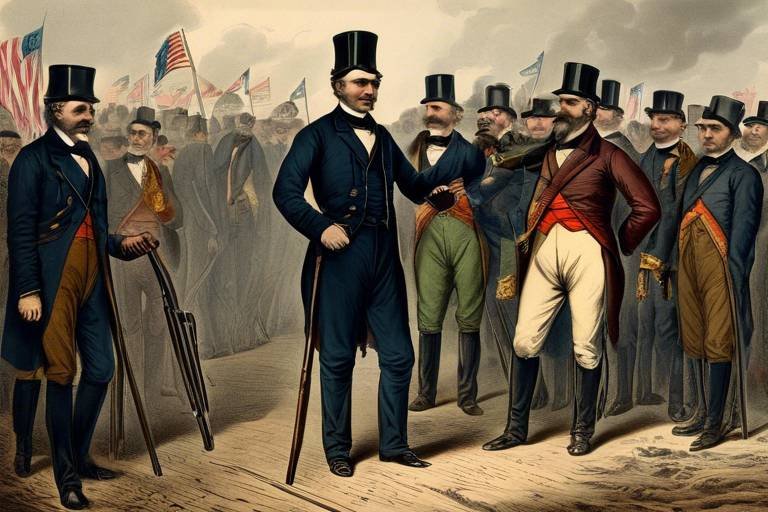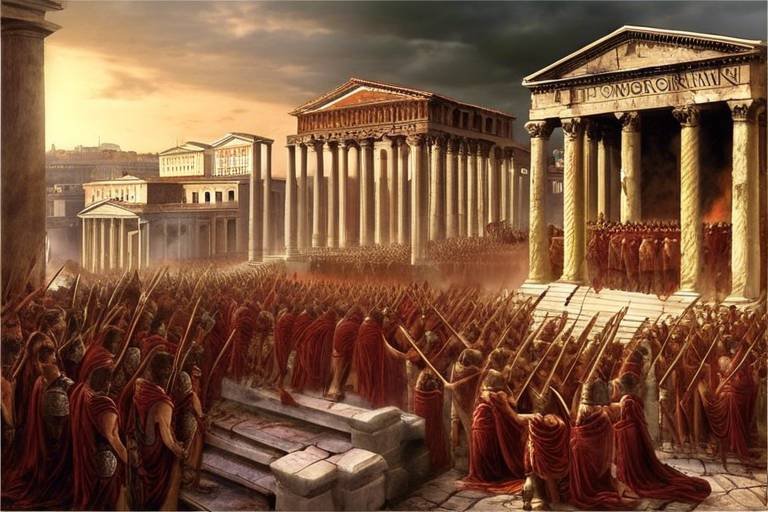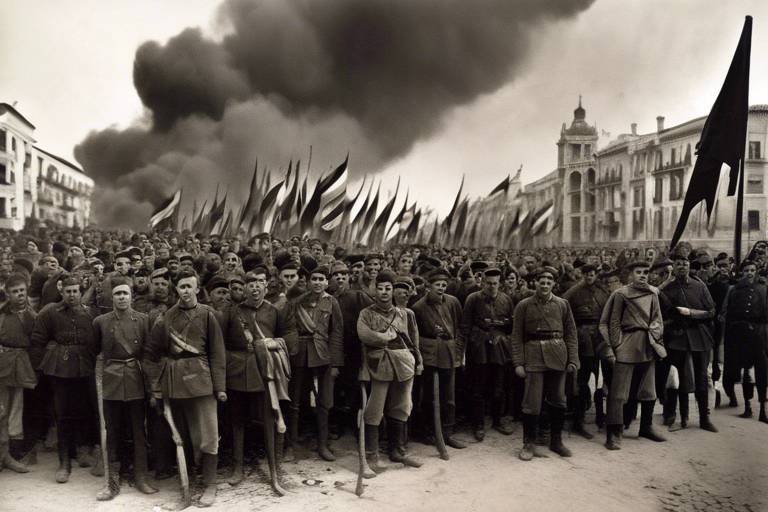The Legacy of Alexander the Great - Conqueror and Visionary
When delving into the legacy of Alexander the Great, one cannot help but be awed by the sheer magnitude of his conquests and the visionary leadership that guided his every move. From the ancient civilizations of his time to the modern societies of today, Alexander's influence reverberates through history, shaping cultures, politics, and military strategies for centuries to come.

Early Life and Education
Exploring the lasting impact of Alexander the Great, his conquests, and visionary leadership on ancient civilizations and modern societies, shaping cultures, politics, and military strategies for centuries to come.
Delving into Alexander's upbringing under the tutelage of Aristotle, his early military experiences, and the influences that shaped his ambitious vision for conquest.
Alexander, born in 356 BC in Pella, Macedonia, was the son of King Philip II and Queen Olympia. From a young age, he displayed exceptional leadership qualities and a thirst for knowledge. Under the guidance of Aristotle, one of the greatest philosophers of all time, Alexander received a comprehensive education in philosophy, science, and the arts. This early exposure to diverse fields of study laid the foundation for his future endeavors as a conqueror and visionary leader.
As a young prince, Alexander accompanied his father on military campaigns, where he gained firsthand experience in warfare and strategy. These early experiences on the battlefield honed his tactical skills and instilled in him a deep understanding of military logistics and leadership. Inspired by the heroic tales of Greek mythology and the military exploits of his father, Alexander harbored a burning ambition to surpass their achievements and carve out his own legacy through conquest and empire building.
Driven by a desire to fulfill his destiny as a world conqueror, Alexander embarked on a relentless pursuit of power and glory. His early education, combined with his exposure to the realities of warfare, shaped his vision of creating a vast empire that would unite diverse cultures under his rule. This ambitious vision, fueled by a blend of intellectual curiosity and martial prowess, set the stage for Alexander's legendary conquests and enduring legacy as one of history's greatest leaders.

Conquests and Empire Building
Exploring the lasting impact of Alexander the Great, his conquests, and visionary leadership on ancient civilizations and modern societies, shaping cultures, politics, and military strategies for centuries to come.
When it comes to Alexander the Great's conquests and empire building, one cannot help but marvel at the sheer scale and audacity of his military campaigns. From the plains of Gaugamela to the deserts of Egypt, Alexander's armies carved a path of conquest that stretched from Greece to India, establishing one of the largest empires in history.
His strategic brilliance and bold vision propelled him to victories in iconic battles like Gaugamela and Issus, where he outmaneuvered and outsmarted his opponents with a combination of speed, tactics, and sheer determination. The empire he built was a testament to his ambition and military prowess, showcasing his ability to adapt to diverse terrains and challenges.
Through a table of conquests and territories conquered, one can truly grasp the extent of Alexander's empire and the regions he brought under his rule. The table would illustrate the vast expanse of his conquests, from the Mediterranean to the borders of the Indian subcontinent, showcasing the diversity of cultures and peoples he encountered along the way.
Moreover, the legacy of Alexander's empire building extended beyond mere conquest. It laid the foundation for cultural exchange and syncretism, as Greek, Persian, Egyptian, and other cultures intermingled and influenced each other, giving rise to the vibrant Hellenistic culture that flourished in the wake of Alexander's conquests.
His empire was not just a political entity but a melting pot of ideas, art, and architecture, where diverse traditions blended and evolved, leaving a lasting impact on the regions he conquered. The cultural syncretism that emerged from Alexander's conquests paved the way for the spread of Hellenistic art, philosophy, and scientific knowledge, enriching the cultural tapestry of the ancient world.
In conclusion, Alexander the Great's conquests and empire building were not just feats of military might but also testaments to his vision and ambition. His legacy as a conqueror and visionary leader continues to inspire awe and admiration, shaping the course of history and leaving an indelible mark on the world.
- What was the extent of Alexander the Great's empire?
- How did Alexander's conquests influence the cultures of the regions he conquered?
- What were some of the key battles in Alexander's military campaigns?
- How did Alexander's empire contribute to the spread of Hellenistic culture?
- What was the significance of Alexander's administrative reforms in his empire?

Cultural Syncretism
Cultural syncretism, a term derived from the Greek word "synkretismos," refers to the blending and merging of different cultural elements to create a new, harmonious whole. In the context of Alexander the Great's empire, cultural syncretism played a pivotal role in shaping the diverse societies under his rule. The vast expanse of Alexander's conquests brought together Greek, Persian, Egyptian, and other cultures, fostering a rich tapestry of traditions, beliefs, and practices.
One of the most prominent examples of cultural syncretism during Alexander's reign was the fusion of Greek and Persian customs. This amalgamation gave rise to a unique Hellenistic culture that incorporated elements from both worlds, leading to the development of new art forms, architectural styles, and philosophical ideas. The blending of these diverse cultural influences not only enriched the societies within the empire but also paved the way for cross-cultural exchanges and mutual understanding.
Through the establishment of cities such as Alexandria in Egypt and Seleucia in Mesopotamia, Alexander promoted cultural exchange and interaction among different ethnic groups. These cosmopolitan centers served as hubs of learning, trade, and innovation, where scholars, merchants, and artisans from various backgrounds converged to share their knowledge and expertise. The cross-pollination of ideas in these urban melting pots gave rise to a vibrant cultural milieu that transcended traditional boundaries.
Moreover, Alexander's policy of adopting local customs and traditions in the regions he conquered helped to foster a sense of unity and cohesion among the diverse populations under his rule. By respecting and incorporating the practices of indigenous peoples, Alexander sought to create a sense of inclusivity and acceptance within his empire, promoting cultural diversity and tolerance.
Overall, cultural syncretism under Alexander the Great's empire exemplifies the transformative power of cross-cultural interactions and the ability of diverse societies to coexist and thrive together. The legacy of this cultural fusion continues to resonate in modern societies, highlighting the enduring impact of Alexander's visionary approach to uniting different cultures under a shared ethos of mutual respect and collaboration.

Legacy in Science and Philosophy
Exploring the lasting impact of Alexander the Great, his conquests, and visionary leadership on ancient civilizations and modern societies, shaping cultures, politics, and military strategies for centuries to come.
Delving into the legacy of Alexander the Great in the realms of science and philosophy unveils a rich tapestry of intellectual influence that extended far beyond his military conquests. His patronage of scholars and thinkers laid the foundation for significant advancements in knowledge dissemination and philosophical discourse.
Alexander's establishment of the renowned Library of Alexandria stands as a testament to his commitment to scholarly pursuits. This grand repository of knowledge became a beacon for intellectuals from diverse cultural backgrounds, fostering a spirit of intellectual exchange and innovation.
The fusion of Greek, Persian, and Egyptian cultures under Alexander's empire created a fertile ground for the cross-pollination of ideas. This cultural syncretism not only enriched artistic expressions but also catalyzed scientific discoveries and philosophical inquiries.
Through the dissemination of knowledge across his vast empire, Alexander sparked a renaissance of learning that transcended geographical boundaries. The translation of texts and the exchange of ideas among scholars paved the way for groundbreaking advancements in various fields of science and philosophy.
Moreover, Alexander's visionary approach to promoting intellectual pursuits among his subjects set a precedent for enlightened governance. By encouraging the pursuit of knowledge and fostering a culture of intellectual curiosity, he left a lasting legacy that continues to inspire generations of scholars and thinkers.
In essence, Alexander the Great's legacy in science and philosophy serves as a beacon of enlightenment, illuminating the path for future generations to explore the frontiers of knowledge and engage in profound philosophical contemplations.

Administrative Reforms
During his reign, Alexander the Great implemented a series of aimed at integrating the diverse populations of his vast empire. One of the key aspects of these reforms was the establishment of new cities, known as Alexandrias, strategically located to promote trade, administration, and cultural exchange. These cities served as centers of Greek culture and administration, fostering a sense of unity among the conquered peoples.
Furthermore, Alexander introduced a standardized system of coinage throughout his empire, which facilitated economic transactions and promoted trade across regions. This monetary system helped in the assimilation of different economies under a common financial framework, enhancing economic stability and connectivity.
In addition to economic measures, Alexander promoted the spread of Greek language and customs as a means of cultural unification. By encouraging the adoption of the Greek language in administrative affairs and education, he sought to create a common linguistic and cultural bond among the diverse populations under his rule. This policy not only facilitated communication and governance but also promoted the dissemination of Greek ideas and values.
Moreover, Alexander's administrative reforms included the appointment of local officials to govern regions under his control, allowing for a degree of autonomy while ensuring loyalty to the central authority. This decentralized administrative structure helped in the efficient management of the empire by delegating responsibilities to trusted individuals familiar with the local customs and traditions.
Overall, Alexander the Great's played a significant role in consolidating his empire and fostering a sense of unity among the diverse cultures and peoples under his rule. By implementing policies that promoted economic integration, cultural assimilation, and efficient governance, Alexander laid the foundation for the long-term stability and prosperity of his vast empire.

Death and Succession
Investigating the mysterious circumstances surrounding Alexander's death unveils a web of intrigue and speculation that has fascinated historians for centuries. The sudden demise of the young conqueror at the age of 32 in Babylon in 323 BC remains shrouded in mystery, with theories ranging from natural causes to assassination plots. Was it a fever, poisoning, or perhaps the result of battle wounds?
Following Alexander's death, the power struggles among his generals, known as the Diadochi, led to a tumultuous period of conflict and division as they vied for control of the vast empire he had built. The Wars of the Diadochi reshaped the political landscape of the ancient world, with territories divided among rival successors who carved out their own kingdoms in the wake of Alexander's passing.
The division of Alexander's empire into successor states marked the beginning of the Hellenistic period, characterized by a fusion of Greek and Eastern cultures that would shape the art, literature, and philosophy of the era. The legacy of Alexander's conquests endured through the dynasties established by his generals, such as the Ptolemies in Egypt and the Seleucids in Persia, each leaving their mark on the regions they ruled.

Influence on Military Strategy
Alexander the Great's influence on military strategy reverberates through history like a thunderclap, reshaping the very foundations of warfare. His innovative tactics and strategic brilliance set a new standard for military conquests, inspiring generations of leaders to study and emulate his methods. Imagine a battlefield where speed, flexibility, and decisive action reign supreme, all orchestrated by a visionary commander whose every move is a calculated masterpiece.
One of Alexander's most significant contributions to military strategy was his mastery of combined arms tactics. By seamlessly integrating infantry, cavalry, and siege engines into cohesive fighting units, he created a formidable force capable of adapting to any battlefield scenario. This holistic approach to warfare revolutionized how armies were organized and deployed, setting the stage for future military doctrines to follow.
Moreover, Alexander's emphasis on rapid maneuvers and surprise attacks set him apart as a strategic genius. His ability to outmaneuver larger enemy forces through swift and decisive actions earned him a reputation as a master tactician. By exploiting his enemies' weaknesses and capitalizing on strategic opportunities, Alexander demonstrated the importance of agility and innovation in achieving victory on the battlefield.
Furthermore, Alexander's expertise in siege warfare showcased his meticulous planning and attention to detail. From the strategic placement of siege engines to the coordination of assault tactics, he demonstrated a deep understanding of fortifications and defensive structures. His successful sieges of key cities like Tyre and Gaza highlighted his strategic acumen and relentless pursuit of victory.
In essence, Alexander the Great's influence on military strategy can be likened to a brilliant symphony conductor orchestrating a harmonious blend of instruments to create a masterpiece. His strategic vision, innovative tactics, and unwavering determination continue to inspire military leaders to this day, reminding them that true greatness lies not only in victory but in the enduring legacy of strategic brilliance.

Historical and Cultural Impact
When examining the historical and cultural impact of Alexander the Great, it becomes evident that his conquests reshaped the geopolitical landscape of the ancient world. The vast empire he established stretched from Greece to India, blending diverse cultures and traditions under one rule. This fusion of Greek, Persian, Egyptian, and other influences led to a period known as the Hellenistic era, characterized by a rich exchange of art, architecture, and ideas.
Artistic and literary works inspired by Alexander's legacy continue to captivate audiences, with countless stories and legends depicting his military prowess and visionary leadership. The enduring fascination with Alexander's conquests underscores his status as a legendary figure whose influence transcends time and borders.
Moreover, Alexander's campaigns sparked debates about imperialism and leadership, raising questions about the ethical implications of conquest and the responsibilities of those in power. His legacy serves as a cautionary tale and a source of inspiration, prompting reflection on the complexities of empire-building and the enduring impact of individual actions on history.
As we navigate the complexities of modern geopolitics and cultural exchange, the legacy of Alexander the Great offers valuable insights into the enduring power of ambition, innovation, and strategic vision. By studying his conquests and their aftermath, we gain a deeper understanding of the interconnected nature of historical events and the profound influence of great leaders on the course of civilization.
Frequently Asked Questions
- What were Alexander the Great's most significant conquests?
Alexander the Great's most notable conquests include the defeat of the Persian Empire, the capture of Egypt, and the expansion of his empire into India.
- How did Alexander blend different cultures in his empire?
Alexander promoted cultural syncretism by adopting Persian customs, marrying a Persian princess, and encouraging his soldiers to marry local women, fostering a blending of Greek, Persian, and other cultures.
- What was the impact of Alexander's death on his empire?
Alexander's death led to a power struggle among his generals, resulting in the division of his empire into separate kingdoms ruled by his successors, known as the Diadochi.
- How did Alexander influence military strategy?
Alexander revolutionized military tactics by employing innovative strategies such as combined arms, swift maneuvers, and siege warfare, setting a standard for future military leaders.
- What is Alexander the Great's legacy in modern times?
Alexander's legacy is evident in the spread of Hellenistic culture, the blending of Eastern and Western influences, and the enduring impact of his conquests on global history and military strategy.



















